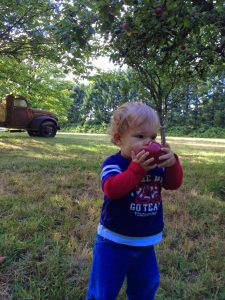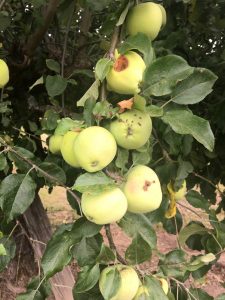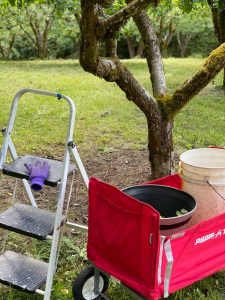Taking charge
 Eight years ago, when we were expecting our son, my husband and I moved to a 6 acre property in Newberg, Oregon. It was a dream of a home: greenery everywhere, apples, plums, pears, flowers, a small forest and a tiny creek. The house was old, but so was the vegetation. When we speak of a building, being old is not a good thing. But when we speak of trees, being old is not a bad thing. It means the plant has already taken root were it is, it means it is probably already fruiting, it means it is accustomed to the biome around it.
Eight years ago, when we were expecting our son, my husband and I moved to a 6 acre property in Newberg, Oregon. It was a dream of a home: greenery everywhere, apples, plums, pears, flowers, a small forest and a tiny creek. The house was old, but so was the vegetation. When we speak of a building, being old is not a good thing. But when we speak of trees, being old is not a bad thing. It means the plant has already taken root were it is, it means it is probably already fruiting, it means it is accustomed to the biome around it.
The first couple years were beautiful. I was thankful for all the fruit, and all the easy nature we were surrounded by. Little did I know the trees were all reciprocating the lovely care the previous owner had given them. I soon began to see a decline in the quantity and quality of the apples and pears.
 I started to pick rotten apples, to see blackened leaves on the trees, to not be able to eat one single pear from our property without carefully removing the browned part where the worm was lodged.
I started to pick rotten apples, to see blackened leaves on the trees, to not be able to eat one single pear from our property without carefully removing the browned part where the worm was lodged.
That change happened around the time we had our daughter, which naturally meant I had less time and less self confidence to tackle a new endeavor such as caring for plants – not for lack of desire, but rather for lack of perceived time, ability, and energy.
For years I had dreamed of living off the land, even before I moved to the Pacific Northwest. For years I had wanted to grow my own food, and to have a green thumb. For years I have wanted to take charge of this land, get to know our plants, learn to improve the crops and thank our fruit trees with some much needed tailored care for their generosity giving what they can. And for years I have been overwhelmed by the dimension of the task, considering all the other facets of my life.
Being a teacher, a mother, a wife, and a woman leaves me very little time – and mental space – to be a farmer. Every time I started something, I felt like I dropped it before seeing the results. Except for strawberries. It is very hard to do strawberries wrong. Although I eventually lost even the strawberries. I had the plants, but no fruit.
Over the years, I have designed uncountable hummingbird gardens, I have bought a book about companion gardening and another one about “canning your bounty”; I have planned planter beds, I have bought and killed dozens of vegetable starters, I have envied and photographed other people’s gardens, and I have photographed and enjoyed a few small victories of my own garden – like the first few years of the strawberries.
Recent events made me be slightly hopeful I would finally have time to dive deeper. When we were first told to stay home due to COVID-19, I thought -“Maybe now I will have plenty of time to research and put into practice all the garden care to make this property flourish once again.”
But the house and the living beings in it took priority. I was home, alright, but so were the kids. And to keep doing school at home, they need as much guidance as I can give them while I too work from home and try to figure out how to distance-teach my students. I am glad being home means the house is not looking like a hoarders episode more often than before, even with four of us here 24/7, but I was disappointed with the very small amount of time I had left to dedicate to the dream of taking charge of our land.
Even though I wasn’t all of a sudden gifted all the time in the world, I have now so much more disposition than when I have my regular routine, working at the school 8-10 hours a day, picking up the kids at their school, trying to spend some “quality time” with them, taking them to sports and classes, making and serving dinner, supervising baths and toothbrushing, tucking kids in, showing the husband some love, and getting myself to bed. In addition, working at home makes it so much easier for me to take a quick trip to the strawberry patch to check for the moisture level and make sure the slugs haven’t found it yet, or to come visit the blueberries to make sure they are hanging in there and fighting for their lives, to see if the seeds we planted have sprouted or not, to daydream about the changes I would like to make to turn my little patches into pretty Joanna Gaines gardens.

So I am slowly becoming a little bolder, and a little more curious, and – dare I say? – a little more knowledgeable. I am honestly not sure where any of my attempts will take my garden, but at least now, for the first time, I am intentionally attempting different things based on results I would like to see, and I am somewhat seeing them through. I am, for the first time, taking charge of our property’s orchard – all within my limits, of course.
Because I have no farming background whatsoever, and no farming family, and no farming studies, I often doubt my evaluation of the situation I am facing. I have decided, though, to take my best guess – or maybe hypothesis, since it is all based on evidence – and run with it. I am dealing with plants in a pretty dire situation in most cases, so I reckon the only way is up.
No comments.